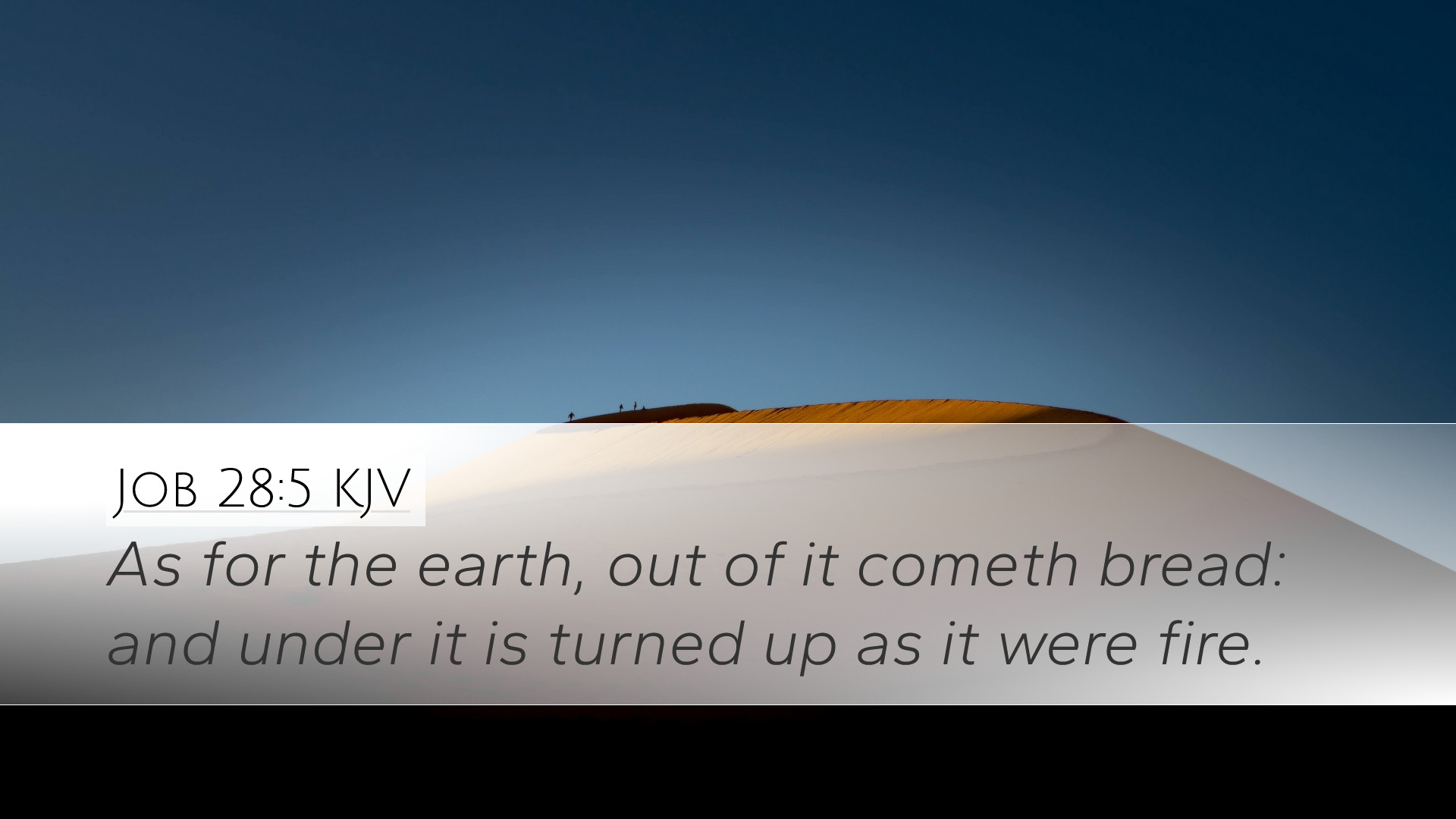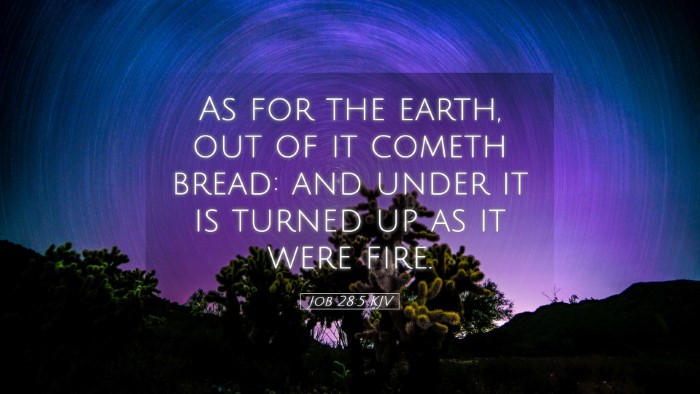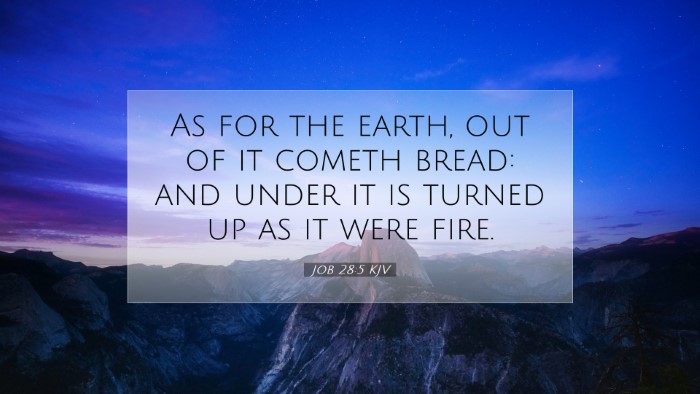Old Testament
Genesis Exodus Leviticus Numbers Deuteronomy Joshua Judges Ruth 1 Samuel 2 Samuel 1 Kings 2 Kings 1 Chronicles 2 Chronicles Ezra Nehemiah Esther Job Psalms Proverbs Ecclesiastes Song of Solomon Isaiah Jeremiah Lamentations Ezekiel Daniel Hosea Joel Amos Obadiah Jonah Micah Nahum Habakkuk Zephaniah Haggai Zechariah MalachiJob 28:5
Job 28:5 KJV
As for the earth, out of it cometh bread: and under it is turned up as it were fire.
Job 28:5 Bible Commentary
Job 28:5 - Commentary and Insights
Job 28:5 states: "As for the earth, out of it comes bread: and under it is turned up as it were fire." This verse is situated in Job's profound discourse on the nature of wisdom, especially within the context of human suffering and the search for understanding divine purposes.
Contextual Overview
In the Book of Job, the central theme involves human suffering, the quest for wisdom, and God’s inscrutable plans. Chapter 28 stands out as a poetic reflection on wisdom, where Job presents a contrast between worldly knowledge and the divine wisdom that eludes mankind.
Literary Structure
Job 28 can be seen as a hymn to wisdom. The chapter begins with a vivid description of man's industrious efforts to mine precious metals and stones from the earth, signifying the human pursuit of wisdom and understanding. However, Job concludes that true wisdom cannot be found in earthly pursuits. This verse serves as a critical pivot in that narrative.
Exegesis of Job 28:5
Detailed Analysis
The phrase "As for the earth, out of it comes bread" illustrates the earth's inherent ability to provide sustenance for humanity. This alludes to the creation narrative, where God provides for His creation. However, the latter part of the verse, "and under it is turned up as it were fire", presents a stark contrast, suggesting hidden depths and beauty (as in minerals) obscured by the surface.
Commentary from Matthew Henry
Matthew Henry notes that this passage reflects on the earth's dual capacity to yield nourishment (bread) and hidden treasures (fire). He emphasizes that while the earth is a provider of basic needs, it also suggests that beneath its surface lies a reality of destruction (fire). This demonstrates the complexity of God’s creation, where provision and peril coexist.
Insights from Albert Barnes
Albert Barnes elaborates on the imagery of the earth producing bread. He emphasizes God’s provision and the metaphorical significance of fire, which can represent both trials and purification. In the context of wisdom, Barnes argues that earthly wisdom, while essential, is insufficient for understanding the divine mysteries of God's purpose in human suffering.
Reflection from Adam Clarke
Adam Clarke highlights the natural world as a testament to divine wisdom. He points out that from the earth, we gain sustenance, yet there exists a deeper understanding of life’s complexities—symbolized by fire. Clarke suggests this duality encourages believers to seek wisdom beyond mere physical existence, looking instead to God for spiritual insight.
Theological Implications
- Understanding Provision: This verse highlights the relationship between God, humanity, and the earth. It calls attention to God as the ultimate provider of both physical sustenance and wisdom.
- The Nature of Wisdom: True wisdom is not simply derived from earthly things, but must be sought from God. This reinforces the New Testament call to seek first the kingdom of God.
- Human Limitations: Job acknowledges the limits of human understanding in contrast to divine purposes. This humility is essential for those pursuing theological studies and pastoral care.
Applications for Pastors and Theologians
This verse can serve as a sermon illustration on the nature of God’s provisions and the call for deeper spiritual understanding amidst suffering. Pastors can encourage their congregations to look beyond the immediate earthly reality to find the wisdom that comes only through faith and divine revelation.
The implications drawn from Job 28:5 also suggest a need for continuous learning and humility in theological studies, recognizing that the quest for understanding is a lifelong journey that must be rooted in prayer and reliance on God’s guidance.
Conclusion
Job 28:5 encapsulates a profound truth about the dichotomy of earthly existence and divine wisdom. It urges readers to not only contemplate the physical provisions of God but also to diligently seek the greater understanding of His plans that transcend human knowledge. Through the insights of esteemed commentators, we are reminded that while the earth provides bread, it is the divine wisdom from above that truly sustains and fulfills.


